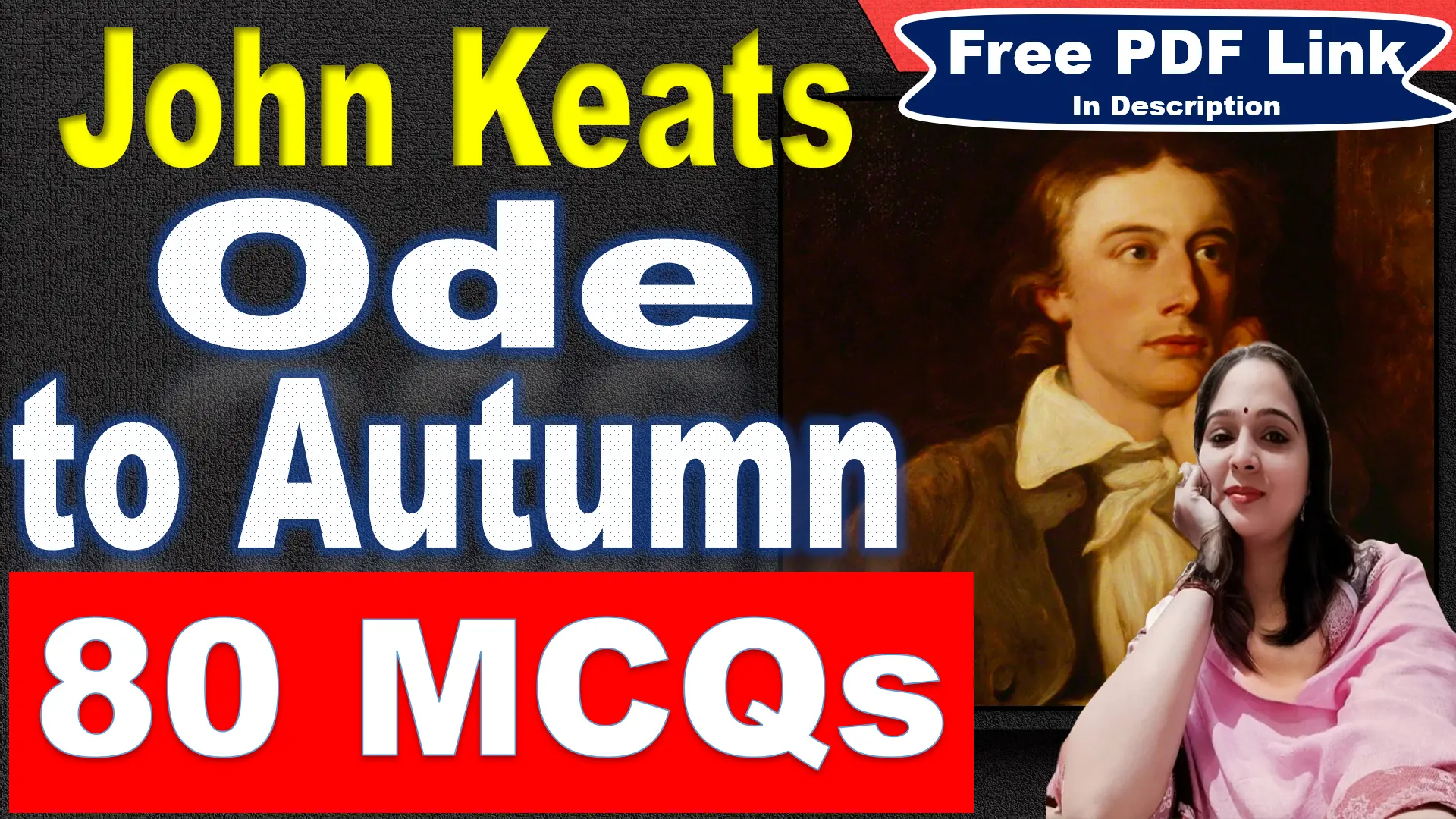
The Visitor Poem Analysis
Stanza 1
Three times the crow has cawed
At the window baleful eyes fixed
On mine, wings slightly raised
In sinister poise, body tense
And neck craned like a nagging woman’s
Filling the room with voice and presence.
Explanation: In the opening stanza of The Visitor, Nissim Ezekiel establishes a mood of tension and unease by introducing a crow at the speaker’s window. The crow caws three times, a number frequently linked to superstition and bad omens. Its “baleful eyes” fix on the speaker, contributing to a sense of forewarning. The imagery of the crow with “wings slightly raised” in a “sinister poise” enhances its threatening presence, suggesting that it is either ready to strike or deliver an important message. The comparison of the crow’s “neck craned like a nagging woman’s” adds another layer of discomfort, evoking something both familiar and unwelcome, heightening the image of persistent tension.
The stanza presents the crow as a symbol of something significant, potentially foreshadowing an upcoming event or visitor that may disrupt the speaker’s world. Its overwhelming presence within the room highlights how it commands the speaker’s attention, setting the tone for the poem’s further exploration of the contrast between expectation and reality.
Poetic Device
Imagery: Ezekiel employs vivid imagery, such as “baleful eyes,” “wings slightly raised,” and “neck craned,” to paint a striking picture of the crow. These descriptions not only create a visual impact but also stir an emotional response, evoking an atmosphere of menace and building anticipation.
Simile: The simile “neck craned like a nagging woman’s” draws a comparison between the crow’s posture and that of a persistent, bothersome figure. This comparison gives the crow a human-like quality, further amplifying the tension and unease surrounding its presence.
Personification: Ezekiel personifies the crow, attributing it with “baleful eyes” and a “sinister poise,” as if it possesses a human-like intent to cause distress. This personification adds a sense of malice and purpose to the bird, making it feel like an active, deliberate force haunting the speaker.
Symbolism: The crow serves as a powerful symbol, traditionally associated with bad luck or ominous signs. Its presence in the poem lays the foundation for the theme of unfulfilled expectations, suggesting that something significant—though ultimately disappointing—is about to occur.
Stanza 2
Three times I got the message,
Sleep-walking on the air of thought
With muddy clothes and floated down,
concerned for all created things,
To cope with the visitor,
Whose terms would compromise my own.
Explanation: In this stanza of The Visitor, the speaker reflects on receiving a message three times, possibly from the crow, as if in a trance-like state, “sleep-walking on the air of thought.” This imagery suggests that the speaker is deeply introspective, mentally drifting between thoughts and reality. The phrase “muddy clothes” signifies that, despite this mental detachment, the speaker remains tethered to the imperfections and challenges of everyday life. The mention of being “concerned for all created things” introduces a broader sense of responsibility or empathy, hinting at a spiritual or philosophical layer to the speaker’s contemplative state.
The closing lines allude to an anticipated visitor whose “terms would compromise” the speaker’s own. This implies that the speaker is bracing for an encounter that may challenge their beliefs, values, or current state of mind. The visitor is depicted as a figure or force with its own agenda, potentially leading to a conflict between external expectations and the speaker’s personal desires.
Poetic Device
Metaphor: “Sleep-walking on the air of thought” is a metaphor that describes the speaker’s mental detachment and introspective state. The speaker is not literally sleep-walking but is mentally drifting through thoughts, disconnected from reality.
Imagery: The phrase “muddy clothes” provides a striking image of the speaker being grounded in the dirt and messiness of life, despite their abstract or philosophical thinking. It emphasizes the contrast between elevated thoughts and everyday struggles.
Personification: The visitor is described as having “terms” that would compromise the speaker’s own. This personification of the visitor gives it agency and power, suggesting it has the ability to negotiate or impose conditions on the speaker.
Symbolism: The “visitor” symbolizes a challenge, test, or significant encounter in the speaker’s life, representing external forces or events that may disrupt the speaker’s personal equilibrium.
Stanza 3
All day I waited, as befits
The folk belief that following
The crow a visitor would come,
An angel in disguise, perhaps
Or else temptation in unlikely shape
To test my promises, ruin my sleep.
Explanation: In this stanza, the speaker spends the day waiting, guided by the traditional “folk belief” that a crow’s presence foretells the arrival of a visitor. This expectation, rooted in superstition, suggests the speaker is well-acquainted with these old beliefs and anticipates something significant after the crow’s appearance. The speaker envisions the visitor as possibly being an “angel in disguise,” symbolizing hope, guidance, or a form of divine intervention. Alternatively, the visitor could be “temptation in unlikely shape,” representing a challenge that might test the speaker’s moral strength, principles, or commitments.
The speaker further reflects that the visitor may be present to “test my promises,” indicating a personal struggle or moral conflict. The visitor is seen as a potential disruptor, someone who might “ruin my sleep,” symbolizing a disturbance not only to the speaker’s physical rest but also to their mental peace and stability. This sense of anticipation creates unease, with the speaker caught between the expectation of divine judgment or guidance and the possibility of being tempted or led astray.
Poetic Device
Allusion: The reference to an “angel in disguise” alludes to religious or spiritual beliefs where divine beings often appear in unexpected forms to test or guide humans. This adds a mystical layer to the speaker’s anticipation.
Juxtaposition: The poet contrasts the potential visitor as either an “angel” or a “temptation,” representing the duality of good and evil, spiritual elevation versus moral downfall.
Imagery: The image of a visitor “ruining my sleep” is both literal and metaphorical. On the surface, it suggests insomnia or restlessness, but metaphorically, it represents an existential disturbance.
Foreshadowing: The expectation that the visitor might “test my promises” or “ruin my sleep” hints at the conflict or disruption to come, which the speaker anticipates with tension and uncertainty. This builds anticipation for the reader as well.
Metaphor: “Ruin my sleep” serves as a metaphor for emotional or mental disturbance, not just physical rest. It suggests an intrusion into the speaker’s inner peace, highlighting the anxiety over the impending visitor.
Stanza 4
It was not like that at all,
His hands were empty, his need :
Only to kill a little time.
Between his good intentions
and my sympathy, the cigarette smoke
was more substantial than our talk.
Explanation: In this stanza, the speaker reflects on the arrival of the visitor, revealing that the reality fell far short of the intense anticipation. The speaker admits, “It was not like that at all,” marking the anticlimax of the visitor’s presence. Rather than an angelic figure or a source of temptation, the visitor arrives with “empty hands” and no pressing need, simply there to “kill a little time.” The interaction, expected to be meaningful or transformative, proves to be superficial. The contrast between the visitor’s “good intentions” and the speaker’s “sympathy” highlights the emptiness of the encounter. The phrase “the cigarette smoke was more substantial than our talk” poetically conveys the triviality of their conversation, suggesting that the act of smoking held more weight than their words, underscoring the shallow nature of their exchange.
Poetic Device
Irony: The entire stanza is steeped in irony. After the buildup of expectation—of an angel or temptation—the reality is mundane. The visitor’s purpose is simply “to kill a little time,” a stark contrast to the speaker’s initial anticipation of a meaningful or challenging encounter.
Anticlimax: This device is evident in the way the speaker’s grand expectations are deflated. Instead of a life-altering event or significant interaction, the visitor’s arrival is anticlimactic, marked by trivial conversation.
Metaphor: The phrase “the cigarette smoke was more substantial than our talk” is a metaphor for the lack of depth in their interaction. The smoke, something intangible, is used to illustrate how insubstantial their conversation was, implying it was fleeting and meaningless.
Symbolism: “Empty hands” symbolizes the lack of significance or offering from the visitor. It represents the unfulfilled expectations, as the visitor brings nothing of importance to the speaker.
Stanza 5
I see how wrong I was
Not to foresee precisely this :
Outside the miracles of mind,
The figure in the carpet blazing,
Ebb-flow of sex and the seasons,
The ordinaries of most events.
Explanation: In this closing stanza, the speaker reflects on their disappointment, admitting, “I see how wrong I was,” and acknowledging that their initial expectations were misguided. The speaker realizes that they should have anticipated the reality of the visitor as being mundane and ordinary, rather than the profound or supernatural encounter they had imagined. The “miracles of mind” represent the grand, imaginative expectations the speaker had created, only to be let down by the simplicity and ordinariness of life.
The phrase “figure in the carpet blazing” suggests that the speaker once perceived deep meaning or hidden patterns in life’s small details, believing that certain events held significant weight. However, the “ebb-flow of sex and the seasons”—symbolizing the natural cycles of human existence—serves as a reminder that life primarily consists of ordinary, repetitive rhythms. In the end, the speaker comes to terms with the fact that most events are unremarkable, and their dramatic expectations were ultimately unfounded.
Poetic Device
Allusion: “Figure in the carpet blazing” may allude to Henry James’ novel The Figure in the Carpet, where characters search for hidden meaning in an author’s work. Here, the phrase symbolizes the speaker’s former belief that life holds deeper, hidden meanings that can be uncovered.
Metaphor: The “miracles of mind” is a metaphor for the imaginative and grand expectations created in the speaker’s thoughts, which contrast with the ordinary nature of life.
Imagery: The vivid imagery in “figure in the carpet blazing” and “ebb-flow of sex and the seasons” creates a sense of both the extraordinary and the natural, symbolizing the speaker’s past illusions versus the reality of life’s cycles.
Symbolism: “Ebb-flow of sex and the seasons” symbolizes the natural, recurring aspects of life, such as birth, death, love, and time. It points to the inevitable and mundane cycles of human existence, grounding the speaker’s realization that most events are ordinary.
Antithesis: The contrast between “miracles of mind” and “the ordinaries of most events” highlights the opposition between the speaker’s previous imaginative thinking and the eventual realization of life’s simplicity.





